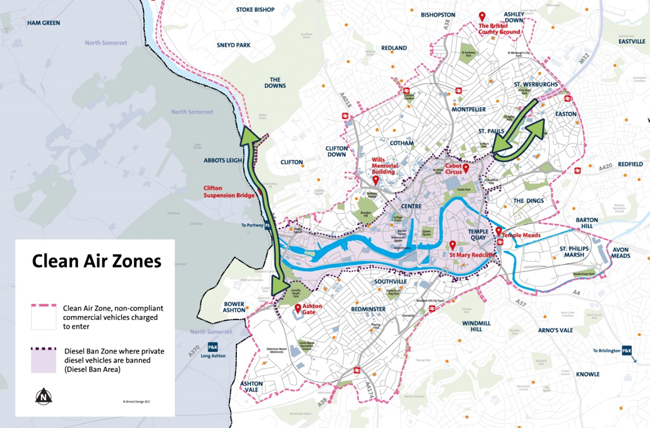Campaigners have slammed Bristol City Council and the Government for ‘softening and stalling’ plans to tackle toxic air pollution in the city.
As Transport Network has reported, the council has blamed environment department Defra for delays in finalising its plan to deal with illegal levels of nitrogen dioxide, which mainly comes from diesel road vehicles.
The council anticipates that its watered-down measures will not bring the city into compliance with the Air Quality Directive in 2025.
Environmental campaign group ClientEarth pointed out that the directive, which imposes legal limits on pollution, came into force in 2010.

Map showing Bristol's latest plans to restric traffic
Clean air lawyer Katie Nield told Transport Network: ‘It’s already been 10 years since legal air pollution limits should have been met, so it’s deeply worrying that Bristol is looking to weaken plans to get the dirtiest cars out of the city centre. Particularly as it is people from the poorest backgrounds who often suffer the worst impacts of pollution while contributing the least to the problem.
‘Instead of constantly softening and stalling action to tackle pollution, Bristol and central government need to put ambitious plans forward to protect people’s health and help those who live and work in Bristol to move to cleaner forms of transport.’
Having secured yet another set of deadline extensions from ministers, Bristol submitted an outline business case in November last year, with the aim of submitting a revised business case by the end of February.
However, the council has said that as ministers have not approved its outline business case, it would miss the deadline for the full plan.
Under mayor Marvin Rees, Bristol has held out against introducing a Class D Clean Air Zone (CAZ) that would charge private vehicles. Instead it has proposed a Class C CAZ, along with a city centre ban on diesel vehicles, for which it does not currently have legal authority, and other measures.
Since submitting its outline plan, the council has reduced the number of roads covered by the diesel ban.
Register now for full access
Register just once to get unrestricted, real-time coverage of the issues and challenges facing UK transport and highways engineers.
Full website content includes the latest news, exclusive commentary from leading industry figures and detailed topical analysis of the highways, transportation, environment and place-shaping sectors.
Use the link below to register your details for full, free access.
Already a registered? Login